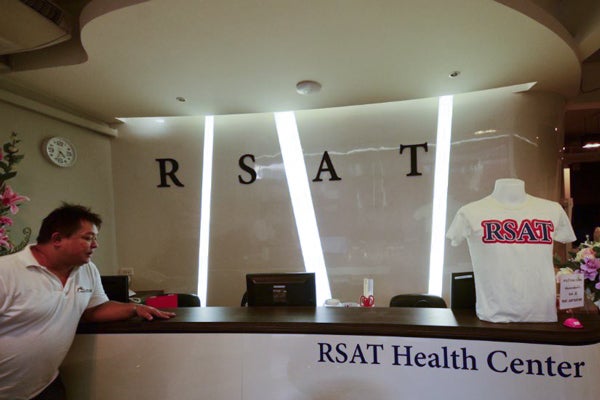
At 44%, the HIV infection rate is high among men who have sex with men (MSM) in Thailand. Despite efforts to promote safe sex, HIV infection rate will rise from 30% now to 59% by 2030 if there is no radical intervention.
In fact, a study on successes and challenges of HIV prevention in MSM indicates that even if we do our best on behavioral interventions, this only makes up 40% of how we should be implementing an HIV outreach program. What is needed is a more comprehensive approach that incorporates from start to finish a “reach-recruit-test-treat-retain” strategy.
Nowadays, this has been done by establishing permanent community-based HIV clinics or health centers, not just mobile clinics. They operate during flexible hours and on weekends, with professionally trained counselors available. Staff also help effectively run the clinics with technical support from doctors and counsellors.
In Bangkok, there are currently three community-based health centers – two by the Rainbow Sky Association of Thailand (RSAT) and another by the SWING Foundation. This is in addition to specialized MSM clinics by the Bangkok Metropolitan Administration, the Silom Community Clinic, the Thai Red Cross’ Anonymous Clinic , and those at private hospitals.
In total, 91 health facilities are available for HIV testing and treatment. Despite this, testing and treatment remains low. Of the 185,000 MSM in Bangkok, only 15,000 were tested for HIV, with 75% of tests done at only two clinics.
In fact, within the first 10 months of the RSAT Health Center’s operation in Bangkok, only 460 people were tested. Out of these, 17% were diagnosed HIV positive. More than 75% of those diagnosed were between 17-24 years old.
Why is there such low HIV testing and treatment? These are some of the factors:
We have learned that MSM are aware of HIV, but many of them still do not know where to get testing and counselling services. But more important, MSM do not come for HIV testing just because they know where the clinic is.
Counselors have acknowledged that people decide to visit clinics because they know an outreach worker, a clinic staff or a friend who visited the clinic before. Therefore, placing ads in traditional, online, and social media may be the first step in making people more aware of the service, but it does not necessarily make them use it.
We need to provide comprehensive knowledge about HIV treatment availability. Many MSM do not want to get tested and prefer not to know their status because they would not know what to do if they are positive.
People who have some knowledge about HIV treatment are more likely to visit clinics than those who have no idea about the treatment at all.
Stigma and discrimination is the greatest barrier stopping MSM from getting tested. Many still fear the social consequences, such as shifts in education and employment opportunities. Many prefer to die rather than know their HIV status.
Investment in HIV responses, in particular for the MSM group, in Thailand is under-funded. A recent report “Scaling up HIV treatment for MSM in Bangkok: What does it take?” finds that at current levels of funding, anti-retroviral treatment medicine will only cover 44.2% by 2022. However, with additional investment of $53.3 million over the next decade, Bangkok could achieve 80% universal treatment coverage within the same period.
Although Thailand is moving in the right direction, more must be done to respond to the rising HIV epidemic among MSM. The bigger question now is: how can we sustain the availability of free testing and treatment while continuously improving service quality even though financial support is gradually decreasing?
Share with us some of the challenges in your country, such as a lack of funding, awareness, cultural barriers, etc. Tell us your thoughts and experiences in tackling these issues.


Join the Conversation